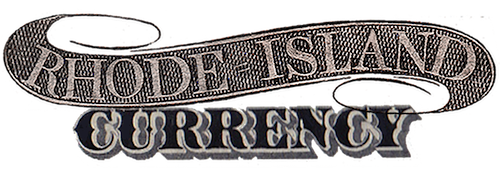Washington County Bank, Carolina Mills
The Washington County Bank was established in 1855 in the village of Carolina in the town of Richmond, in southern Rhode Island. It was connected to the cotton mills begun there in 1841 by Rowland G. Hazard. Hazard, from a family with a long history in South County, had named the area after his wife, Carolina Newbold Hazard. While the village is known as Carolina, the bank’s currency identifies the location as “Carolina Mills.” The bank’s first president is listed as R.G. Hazard, who may or may not have been the same man who founded the mills, spent time in politics and tried his hand at fighting slavery.*
After Hazard, a shady character named W.D. Bannister became president. In 1863, Bannister concocted a scheme to have $750,000 in notes printed by the American Bank Note Company and shipped to the South (the company was founded with a capitalization of only $50,000). When the plan came to light, it brought about the downfall of the institution. The Washington County Bank was placed in receivership in 1864, and closed in 1865.
The Providence Journal attempted to recount this story, but its errors and aspersions inspired the secretary of the American Bank Note Company to file this reply, detailing the whole sordid affair:
“New York, December 10, 1863
“To the Editor of the Providence Journal:
“Dear Sir- As you have connected the name of the American Bank Note Company with the ‘swindle’ of the Washington County Bank in a manner which seems to me rather ambiguous, I beg that you will allow me to state what the Company did, and what it did not do in that matter.
“In October last we printed a circulation of $60,000 from the plates of the Washington County Bank, and delivered them to W.D. Bannister, who was certified to me to be President of the Bank, by its late President, R.G. Hazard.
“After these $60,000 had been delivered, Mr. Bannister called on me to talk about printing more impressions from the same plates.
“I suspected from what he said that he was intending a great fraud. But I saw that if I acted under my suspicions, and declined to negotiate with him, he would not be prevented from carrying out his plans, as he could take his plates away from us and get them printed in some private place. So I accepted his order to print and learned all his intentions. He wanted notes amounting to $750,000 printed from the plates! These notes were to be printed with “green backs” and were to have the signatures of W.D. Bannister, President, and M.H. Du Plessis, Cashier, stamped on them. They were not to be sent to the Bank, but were to be trimmed and packed up in this city, and were to sent down into the Southern States for circulation. Mr. P.C. Doremus of New-York was introduced to me as the person who was to be the ‘circulating medium’ in this city. Mr. Melanchon Bliss (no relation of mine,) No. 68 Wall-street, was also represented to me as an agent of the concern, and Mr. George N. Ennis, of Richmond Switch, R.I., was introduced to me as a half and half partner with Mr. Bannister in the business.
“Of course it took some time and several interviews for me to learn all the facts and I was to say nothing about them. This was the strangest part of all to me, that these people should suppose that we would keep a confidence with rogues, and would assist them in a scheme, which, if successful, would not only swindle our soldiers in the South out of $750,000, but would, for the time, destroy the circulating credit of every bank in the State of Rhode Island.
“In the mean time I had written to H.C. Cranston, Cashier of the National Bank in Providence, informing him that the Washington County Bank proposed to give us a large order for printing, and asking him if it was all right. He replied, saying that the bank was entitled to issue only $32,000 in notes, that he thought a sudden addition to their circulation might be contemplated, but advised me to do what I had already concluded to do, in order to bring the parties to justice.
“We now, after a good deal of delay, made preparations to commence printing the $750,000. I required Mr. Bannister to pay me $700 in advance toward the expense of printing, which he did. All was going along apparently very smoothly, when on the third of this month, Mr. Bannister brought back to me $24,300 of the notes of his bank, which we had delivered to him in October. These he wanted us to number, and to print on them the signatures of the President and Cashier.
“As I had learned from Mr. Cranston’s letter that the bank was entitled to issue only $32,000, and as they had already obtained from us $60,000, which was $28,000 more than the law of Rhode Island allowed, I thought it time now to act on my suspicions, and I resolved that this $24,300 should be sent to Governor Smith instead of returned to Mr. Bannister. These notes, numbered and signed, were to be ready, and Mr. Bannister was to call for them at 2 o’clock on Monday the 7th instant.
“On Friday, the 4th last, I met at my hotel my friend, John B. Palmer, of Providence, to whom I parrated this whole affair and explained my plans, and asked his counsel and assistance. He left for Providence the next morning, (Saturday,) promising to see Gov. Smith that evening, for the purpose of having an officer sent on in the mail train of Sunday night, who should come with the authority of the State to take possession on Monday morning of all the plates and impressions of the Washington County Bank that were in our hands.
“At 5 o’clock on Monday morning, a note was slipped under the door of my room at the Fifth Avenue Hotel, stating that Col. Charles E. Bailey, private secretary of Gov. Smith, had just arrived, and wished to see me on important business before I went down town.
“Col. Bailey brought letters to me from the Governor and also from the Bank Commissioners (C.T. Robbins and Charles Hart,) authorizing him to receive from this Company all the bank note plates and impressions of the Washington County Bank.
“At 12 o’clock of that day they were all delivered, and in the hands of the express company on their way to Gov. Smith. When Mr. Bannister called, at 2 o’clock, he found that his bubble had burst.
“In regard to the $750,000 which we were to print, and which you state were printed by us, I have to say that they were not printed. But, in order to keep up a show of doing the work, we prepared tinted sheets for about $20,000 of it, on which Mr. Bannister expected us to print the note plate. But we never intended to print it, nor to do any thing which should aid him in carrying out this stupendous fraud.
“Now, after this recital, I think it is proper for me to say, that if it had not been for the action of the American Bank Note Company in this matter, this fraud could not have been stopped. The whole plan of detecting and stopping it was conceived and carried out by us, without the knowledge or assistance of the Bank Commissioners, which, it seems to me, ought to have known something about it themselves.
“As this company has many friends and customers in Rhode Island, I have felt called upon, for their benefit , as well as our own, to write you this letter, which do me the favor to publish and oblige,
“Yours truly, William R. Bliss
“Secretary of the American Bank Note Company”
* The letter above mentions that R. G. Hazard was deceased by 1863, which makes it seem unlikely that the bank president is the same man who founded the village of Carolina, Rowland G. Hazard (who is known to have died in 1888). Rowland did have a son who is referred to as “R.G.” and there were certainly numerous members of the large extended family in Rhode Island who shared those initials (some are Rowlands, others Roberts). On the other hand, the letter writer could have been misinformed.
For more on the Washington County Bank, see Roger’s Durand’s “The Internal Revenue Versus The Washington County Bank,” Paper Money, Vol. XXII, No. 1, Whole No. 103, January/February 1983, pp. 26-33. In this piece, Durand relates how the Treasury Department tried to collect unpaid taxes from the institution at the onset of the national banking era. It contains some impressive ephemera from that time.
Several of the notes below are all signed by W.D. Bannister, president, and M.H. Du Plessis, cashier, the ringleaders of the scheme mentioned above.

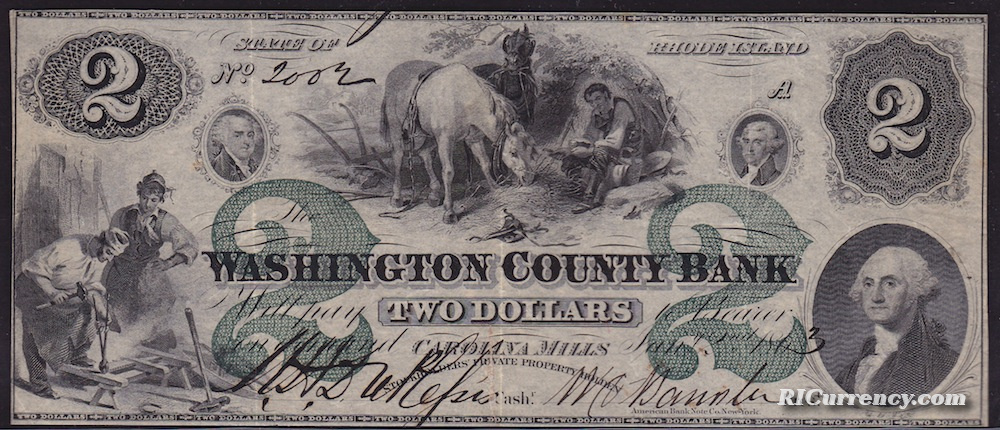
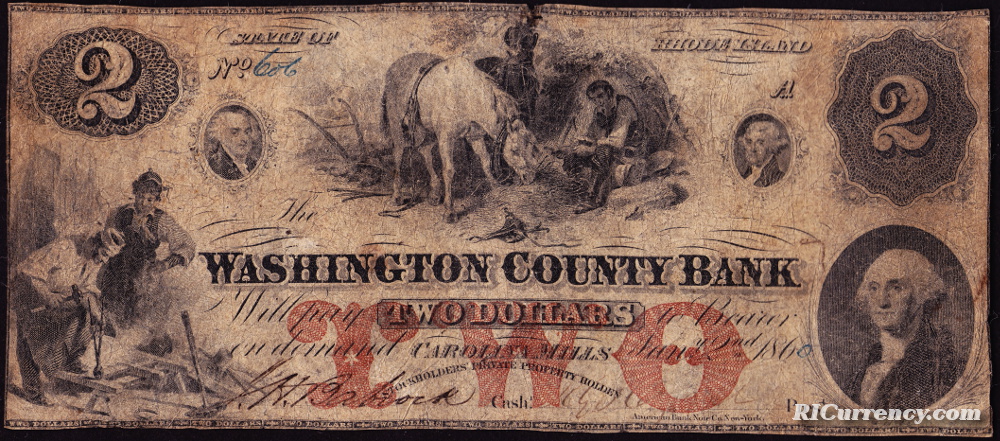

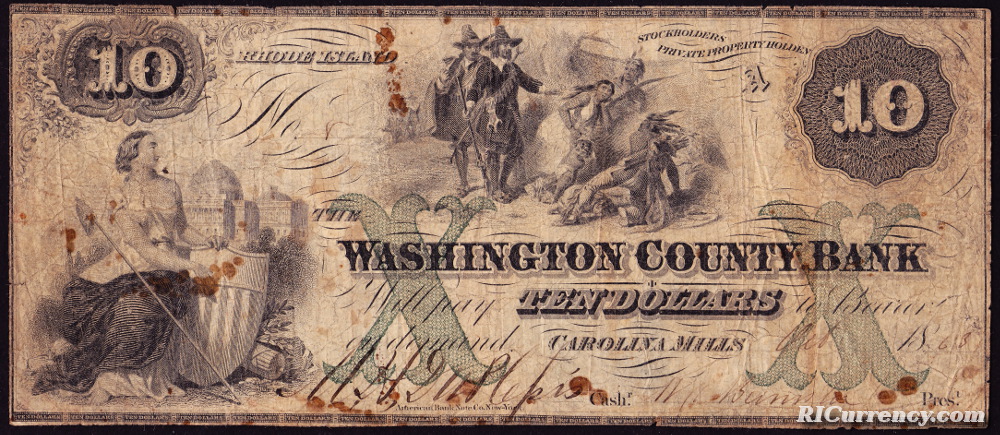
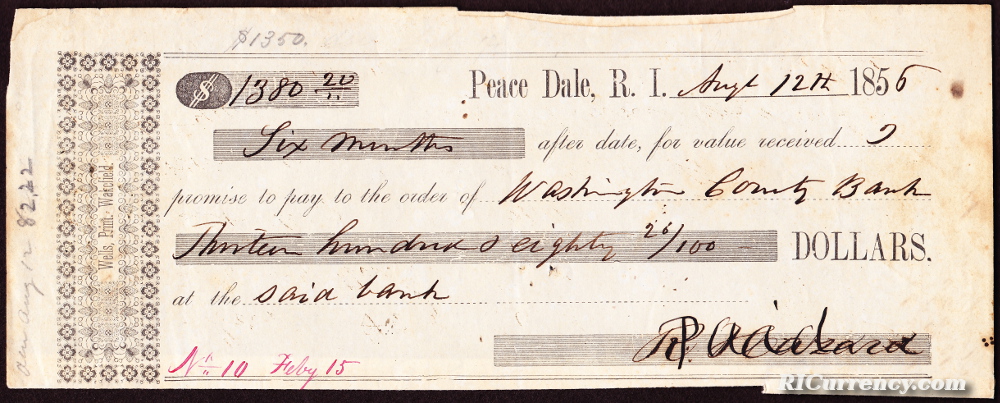
Six-month promissory note, dated August 12, 1856, for $1,380.26. Signed by Rowland Hazard, at Peace Dale, RI.
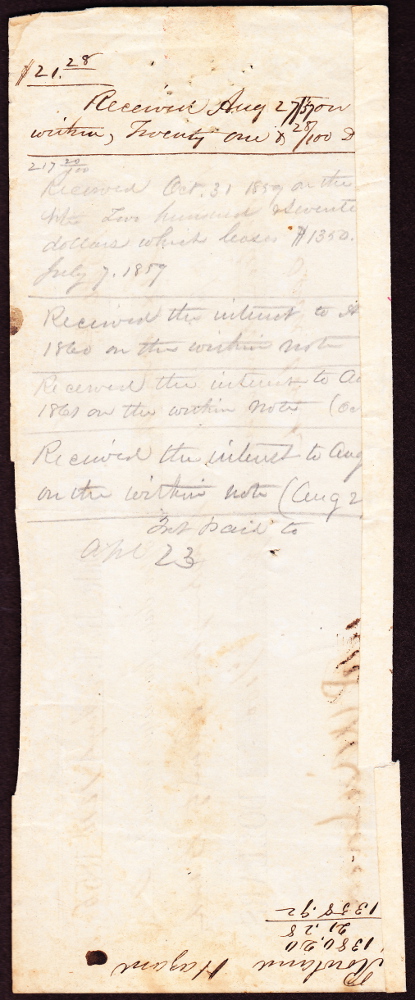
Back of Washington County Bank promissory note.
